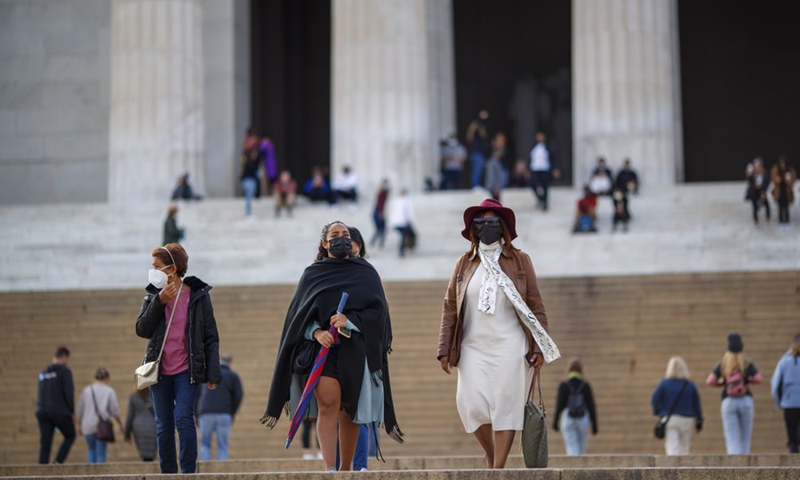Is Biden a life-saving straw for US epidemic?
By GT Staff reporters Source: Global Times Published: 2020/11/9 20:58:40
Nationally coordinated effort a key to taming virus: analysts

People wearing face masks visit the Lincoln Memorial in Washington, D.C., the United States, on Oct. 16, 2020. (Photo by Ting Shen/Xinhua)
With close to 10 million COVID-19 infected patients scattered across communities in US states and the epidemic showing no signs of getting better before Democrat Joe Biden takes office in January, Chinese analysts cast doubts on Biden becoming a life-saving straw for the raging epidemic and moving it to a dramatically different direction.
On Monday, Biden's transition team announced the group of public health experts that will make up his coronavirus advisory board, which includes Rick Bright, a whistleblower from the Trump administration who alleged that his early warnings about the pandemic were ignored and ultimately led to his removal, CNN reported. Revealing the members of the task force is the transition's first major announcement, highlighting the importance Biden attaches to fighting the COVID-19, which has killed more than 237,000 Americans, the report said. Biden also promised to listen to science, keep public informed by public health professionals and restore trust.
However, his victory in the presidential election neither makes dealing with the unprecedented health crisis an easy fix, nor alter the fact that close to 10 million Americans are infected with the virus, public health experts and US studies experts reached by the Global Times said Monday. The leadership change in the US will neither slow down the rate of infection in the short term, nor a nationally coordinated effort will be easily realized, they added.
"The combat against the novel coronavirus would pose a huge test to Biden's power of execution and the US social mobilization ability," said Liang Manchun, an associate research fellow at the Institute for Public Safety Research of Tsinghua University, noting that without a nationally coordinated effort, the US won't be able to tame the epidemic easily.
With division rather than unity between the blue and red states, new policies to be introduced by Biden are unlikely to be executed smoothly in the states controlled by the Republicans, Lü Xiang, a research fellow on US studies at the Chinese Academy of Social Sciences in Beijing, told the Global Times on Monday.
"The only change is that the blue states will receive more assistance from the federal government, but due to the uncooperative attitude of the red states, the nationwide epidemic situation is almost impossible to control in the short term," he said.
Imposing a series of anti-epidemic measures across US states will hurt the economy and cause inconvenience to daily lives of Americans, so convincing some 70 million people who had voted for Trump to accept his plan and mobilizing states to make coordinated response plans to achieve the goals is not up to Biden alone, observers said.
With a huge number of infections, it would be very tricky to find the source of infection and quarantine the close contacts who are scattered across communities of US states, said Wang Guangfa, a respiratory expert at Peking University First Hospital.
Liang's research shows that before Biden eventually takes office in January, the US epidemic will continue to run rampant and would see no turning point at least before the end of November.
On average, one symptomatic novel coronavirus patient is likely to infect three others. If the daily new cases in the US cannot be curbed in the short term, Wang projected that the daily rise in cases would be even faster than the current one. Unlike the epidemic in China and Europe where it has seen sharp fluctuations, the US actually is still facing the first wave of epidemic, Wang said.
According to media reports, the US beat its own record of new daily cases for five days straight, topping 100,000 a day since Wednesday.
The country registered 126,742 cases on Saturday, a new record one-day spike in cases, data showed.
According to US media reports and official websites of Biden and Kamala Harris, the plan includes doubling the number of testing sites, mobilizing some 100,000 people in tracking close contacts and ramping up mask production.
Under Biden's presidency, the US is expected to have more speedy and effective response mechanism, such as leaving enough room for the FDA and the CDC to give professional advice and providing enough medical resources for medical institutes to cope with surging patients, but, all these plans will only come after January 20, Chen Xi, an associate professor of the Yale School of Public Health, told the Global Times on Monday.
During the power transition period, what Biden can do is to influence as many Americans as possible to take non-medical preventive measures against the virus, such as wearing masks, practicing social distancing and avoiding crowded places, Chen said.
Wang also noted that reversing Trump's decision to withdraw from the World Health Organization (WHO) would also lend a hand to Biden in dealing with the epidemic, providing the US better access to epidemic data. The WHO annual meeting that will focus on the COVID-19 pandemic is scheduled to begin later on Monday virtually.
As for seeking cooperation with China, some Chinese observers said the blame game against China might be reduced at least among the White House officials because it is futile for the US to solve the problem, and Biden's team might be more pragmatic in seeking cooperation with China on vaccine research.
"But Chinese should not be too optimistic, because due to the arrogance among some US ordinary people and elites, they would rather be killed by COVID-19 than admit China is doing better than them on the vaccine research and epidemic control. So to what extent the incoming Biden administration will cooperate with China on this issue depends of the attitude of the US, while China will always welcome such cooperation," Lü noted.
Posted in: DIPLOMACY